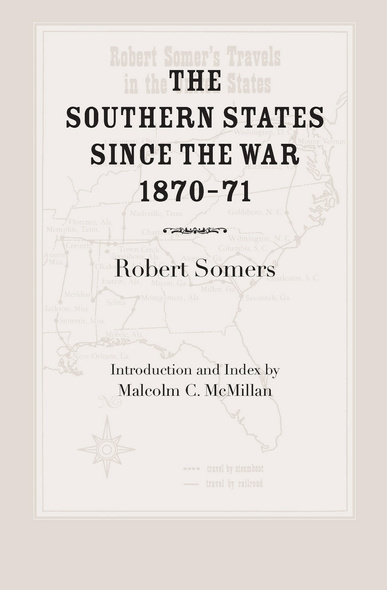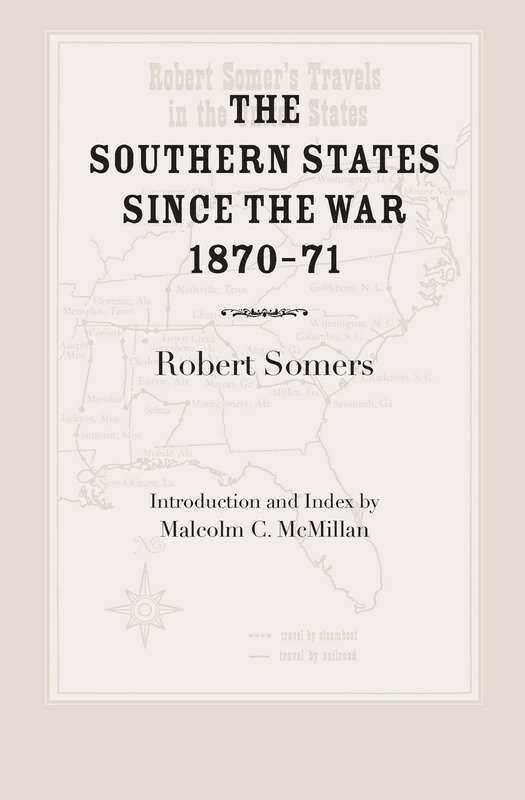The Southern States Since The War
By Robert Somers; Introduction by Malcolm C. McMillan
University of Alabama Press
An extraordinarily valuable contribution to the history of the South during Reconstruction
Somers was fifty-eight years of age when he landed in America in the fall of 1870. His long-time newspaper career and his interest in social and economic matters had prepared him in a very special way to study the South, where the whole way of life had been so lately wracked by war. He was a keen and objective observer, modest and restrained in criticism and praise. On the whole he was optimistic for the future of the South. Although apparently a Southern sympathizer during the War, he was able to subordinate this sympathy and give a fair, detached, and balanced appraisal of economic life, politics and race relations. His interest in politics was confined in the main to their effect on the economic and social phases of the South's welfare.
Since his trip to America was not sponsored by “any Association, mercantile or political,” he was at liberty to record conditions as he saw them. Many of the accounts of conditions in the South in this period may be classified as promotional literature. State bureaus of immigration and agriculture, land companies, railroads and other interested groups hired agents to make favorable reports on cheap lands, on opportunities for industrial enterprise, deposits of minerals and the existence of other natural resources. They exaggerated economic opportunities and favorable political, cultural, and social conditions. Somers, on the other hand, was a true traveler, in the pay of no organization and with no axe to grind. He was particularly interested in economic and social matters: cotton and sugar culture, Negroes, railroads, natural resources, labor, industry, immigration and education. Since an analysis of the South’s economy was Somers’ major objective, his book made an extraordinarily valuable contribution to the history of the South during Reconstruction.
Somers was fifty-eight years of age when he landed in America in the fall of 1870. His long-time newspaper career and his interest in social and economic matters had prepared him in a very special way to study the South, where the whole way of life had been so lately wracked by war. He was a keen and objective observer, modest and restrained in criticism and praise. On the whole he was optimistic for the future of the South. Although apparently a Southern sympathizer during the War, he was able to subordinate this sympathy and give a fair, detached, and balanced appraisal of economic life, politics and race relations. His interest in politics was confined in the main to their effect on the economic and social phases of the South's welfare.
Since his trip to America was not sponsored by “any Association, mercantile or political,” he was at liberty to record conditions as he saw them. Many of the accounts of conditions in the South in this period may be classified as promotional literature. State bureaus of immigration and agriculture, land companies, railroads and other interested groups hired agents to make favorable reports on cheap lands, on opportunities for industrial enterprise, deposits of minerals and the existence of other natural resources. They exaggerated economic opportunities and favorable political, cultural, and social conditions. Somers, on the other hand, was a true traveler, in the pay of no organization and with no axe to grind. He was particularly interested in economic and social matters: cotton and sugar culture, Negroes, railroads, natural resources, labor, industry, immigration and education. Since an analysis of the South’s economy was Somers’ major objective, his book made an extraordinarily valuable contribution to the history of the South during Reconstruction.
Robert Somers was a Scottish newspaperman with a strong interest in social and economic matters. When a Glasgow newspaper he edited failed in 1870, Somers set sail for the US in order to investigate firsthand the effect of the Civil War on the South. For five months he toured the South gathering information both from conversation and from newspapers and other printed material. . . . His book was the work of a perceptive observer. . . . Somers’ visit came at the height of the cotton marketing season, and his chronicle contains much valuable information about changing methods in the trade of the South’s chief crop.’
—Agricultural History
Robert Somers was a happy exception to the usual run of reconstruction visitors. . . . His temperament, education, and journalistic experience caused him to record his Reconstruction observations with remarkable objectivity and restraint. His primary interest was economic, [and] his detailed and perceptive comments on railroads are excellent historical sources. . . . Professor Malcolm C. McMillan’s excellent introduction and index add much to the volume.’
—Bell I. Wiley, The Jackson Sun
Robert Somers (1822–1891) was a Scottish journalist and author. He is also author of numerous books, including Sheriff Court Reform, or Cheap and Speedy Justice.





